Dr. Paul T. P. Wong’s autobiography, A Lifelong Search for Meaning: Lessons on Virtue, Grit, and Faith, is published in weekly installments. Stay updated here.
This chapter was originally published as Wong, P. T. P. (2019, July 6). How I cracked nature’s code for positive mental health: Introduction and my search for meaning. Positive Living in Difficult Times. https://www.meaning.ca/article/how-i-cracked-natures-code-for-positive-mental-health-introduction-and-my-search-for-meaning/
Introduction
Recently, Pastor Ted Tham (譚紹南 牧師), of the Grace Chinese Gospel Church of North York, asked me why Chapter 25 of my online autobiography was missing. First, I thought it was an oversight. Later, I realized that it was supposed to be a chapter on my final thoughts on meaning and mental health. Therefore, I decided to use my article How I cracked nature’s code for Positive Mental Health (Wong, 2019a) with a revised introduction as Chapter 25. Chronologically, this is actually the last chapter of my autobiography.
Towards the end of the second decade of the 21st century, why is our world in tumult? Why are there so many miserable people around us? Why do we keep on fighting each other? Why can’t we get along? These are all troubling questions of meaning.
With a heavy heart, I have witnessed that mental health in North America continues to decline in spite of the progress in science and technology and rising living standards. How do we account for this paradox? What can we do to reverse this trend?
The answers to these puzzling questions seem obvious to me –We are in a mess because the Big Tech, the powerful conglomerates, and the cultural elites have dismissed the important role of religion and spirituality in mental health, and have transformed Western civilization into a materialistic and consumerist society.
Many ordinary people feel helpless and hopeless when their cherished religious traditions are being trashed or mocked. In addition, their preferred lifestyle, which is slower and simpler, is more and more difficult to maintain because of the accelerated technological and social change beyond their control.
My heart aches for the young people and all the innocent children who fear what kind of future awaits them, if the current trend continues unchallenged and unchanged. I will not trust science to save us because it is our blind worship in science alone that got us into this predicament. We need to rediscover and return to the spiritual laws that govern human behaviors in complex relationships; these spiritual laws are nature’s way for moral human behaviors, just as the scientific laws that govern the physical world.
If I do have a dying wish, it is this: let us stop limiting our worldviews to a two-dimensional space and open our eyes to the transcendental invisible reality. Let’s do more research on the spiritual laws in mental health and societal wellbeing so that we can implement these laws in making policies about education and healthcare for the whole person with a soul.
The 3 Spiritual Laws
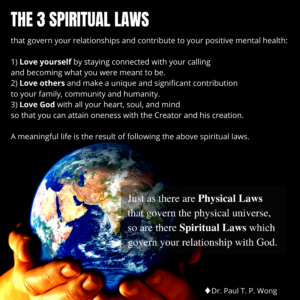 Just as birds are born to fly freely in the skies, fish born to swim in the water, human beings are born to live in a world of meaning and relationships. More specifically, we need: (1) a meaningful life which involves discovering and developing our unique gifts to serve the greater good; (2) belong in loving relationships and a broader community; and (3) to have faith in God or a Higher power for protection, guidance, and consolation in situations beyond human control.
Just as birds are born to fly freely in the skies, fish born to swim in the water, human beings are born to live in a world of meaning and relationships. More specifically, we need: (1) a meaningful life which involves discovering and developing our unique gifts to serve the greater good; (2) belong in loving relationships and a broader community; and (3) to have faith in God or a Higher power for protection, guidance, and consolation in situations beyond human control.
In a nutshell, nature’s way for positive mental health consists of 3 elements: meaning, love, and faith, representing the golden triangle for a healthy and happy life.
This discovery is neither a stroke of genius, nor an act of serendipity, but the result of decades of research and clinical practice. It has become increasingly clear to me that most of human suffering stem from people’s inability to meet their three essential psychological needs for meaning, love, and faith, which can only be met by incorporating the spiritual dimension in order to restore our brokenness into wholeness. Recent research supports the importance of a sense of oneness for life satisfaction (American Psychological Association, 2019).
At present, we are broken within ourselves—with constant inner conflicts from a divided self and from different voices clamouring for our attention. Our family and community are broken—torn by endless fighting because of our greed, pride, and selfishness. Our union with God is broken because of our unbelief, ignorance, and sin.
That is why my meaning therapy aims at getting at the root cause of human miseries through the restoration of faith, relationship, and personal meaning (the golden triangle of positive mental health; Wong, 2020a) with the virtues of courage, acceptance and transformation (the iron triangle; Wong, 2020a).
Therefore, I propose that practicing the following 3 spiritual laws will contribute to our life satisfaction and positive mental health, just as obeying the physical laws is important for our physical health:
- Love yourself by staying connected with your calling. All my research and my lifelong quest for meaning has convinced me of two things: (a) the safest bet on a fulfilling future is to stay connected with your calling or mission, and (b) meaning is not some subjective thing which anyone can make up in their head, but it is something deeply encoded in our genes, just like every cell and every organ inside our body are encoded with a special purpose and function (Ball, 2019).
Therefore, living a life of purpose is just part of human nature. It follows that in order to be true happy, everyone has to be what they were made to be – a writer must write, a musician must do music, and a painter must paint. To do anything that takes them away from their true calling will take away their sense of fulfillment. Picasso said it well: “The meaning of life is to find your gift. The purpose of life is to give it away.”
Healthy self-love is the foundation for good relationships: “Love your neighbour as yourself” (NIV Bible, 1978/2011, Matt. 22:39). In other words, you should treat yourself with the same compassion and empath as you would treat your neighbour. This self-compassion (Neff, 2011) includes accepting the unacceptable part of yourself, and doing Carl Jung’s (2013) Shadow work of embracing your evil twin. Focusing only on your strengths and the bright side is a kind of escapism which cannot calm your inner tumult and integrate the energy from your dark side to realize your dream.
Finding your calling is seldom a linear path. We all have to go through many broken dreams before we discover our true mission. I failed in all my youthful dreams of becoming a poet, a violist, or a painter before I discovered my gift in psychology and God’s calling to serve Him with psychology. A sense of calling has a spiritual, transcendental origin, and we need to do the hard work of self-examination, self-sacrifice, and self-transcendence before we can become what we were meant to be (Wong, 2016).
In recent years, a number of people from Silicon Valley have contacted me for guidance about creating a meaning app. Most recently, I was interviewed by the CEO of Twitter (Canada) about how to find meaning and purpose in life (Executive of a Microblogging Company, 2020). They will not find the true answer as long as they refuse to accept the spiritual origin of meaning and purpose.
- Love others by staying connected with your family and community. We are wired for social relationships (Sukel, 2019); like meaning, love is also encoded in our DNA (Longrich, 2020). Our inner tumults often spill out into our relationships causing unnecessary conflicts. For example, an oversensitive person, because of poor self-esteem, may personalize general statements as scolding him/her. We also project our own fears, insecurity, and selfish motives to others. Thus, achieving inner peace and harmony is a necessary step for interpersonal harmony (Rosmarin, 2020).
Another main obstacle to relationships is the territorial instinct (Montagu, 1968). Both within-group and between-groups conflicts are primarily caused by territorial behavior. Even now, with the creation of the United Nations to maintain world peace, armed conflicts are still taking place. Will the United Nations allow China to invade peace-loving Taiwan, my favourite country? There will always be interpersonal and international conflicts, but we need to learn to co-exist and resolve our difference through peaceful and rational dialogue. Willingness to make personal sacrifice for loved ones is important for marital success (Wong, 2020b) and life satisfaction (Kayabol et al., 2020). Therefore, it behooves us to cultivate altruism (Batson et al., 2011) and self-transcendence (Wong, 2015) as universal virtues. It is also important to understand that we are all members of the same human family coming from the same Creator of all life.
- Love God by faith so that you can stay connected with the Creator & his creation. Faith in God is always a sticky point in a secular and materialistic world. We all have some faith in the supernatural, even though we may not be conscious of it (Rosmarin, 2020; Routledge, 2018). Belief in God or some higher power can be found in all cultures, but the issue of universality of religion remains hotly debated in academic circles (De Reeover, 2013).
However, for everyday living, religious coping is both necessary and universal ((Pargament, 1997; Wong et al., 2006). There is a Chinese saying: “A desperate dog jumps over the wall; a desperate person cries out to the Sky God for help.” It is more rational and adaptive to turn to God for help in circumstances beyond human control. The global pandemic and the resulting economic devastation reveal the limits of personal control. Personally, even though I am considered as a successful person by objective standards, my life remains very difficult.
You can label me neurotic or pessimistic, but all my life experiences have taught me that I am walking in a minefield, and even my narrow path is full of thorns and obstacles (Wong, 2020c). However, am able to remain positive and optimistic because my faith in God makes up for all my deficits and grants me deep joy in the midst of all my troubles (Wong & Bowers, 2018). I begin each day by spending one to two hours in meditation and prayers. This is the best time of my day, when I can focus on thanking God for all his blessings, and praying for his guidance, wisdom, and support. All my best ideas come form prayers.
To me, the best way to survive and thrive in a dangerous and difficult word is to practice the three spiritual laws through inner dialogue in three domains—between my bright side and dark side, between me and others, and between me and God
The Existential Positive Psychology (PP 2.0) of Suffering
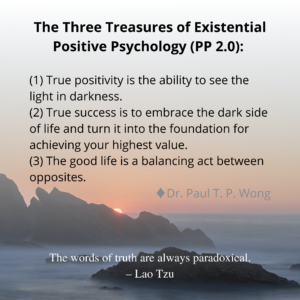
In an ideal world, the above spiritual laws would be superfluous. However, we are living in a broken world, where might is right and the wicked prosper while the righteous languish. We have no satisfactory answer to the question of human evil and why bad things happen to good people. Suffering remains a mystery. But the new science of PP 2.0 allows us to transform suffering into human achievement as Viktor Frankl (1946/1985) liked to say about logotherapy.
My brand of integrative meaning therapy (MT) evolved from logotherapy & existential therapy. It empowers clients to live more authentic and vital lives in spite of the dark side of human existence. It empowers clients to live more freely and fully and become what they are meant to be by overcoming suffering and fulfilling their life’s mission. MT seeks to change people’s attitude towards suffering in the following ways:
(1) Suffering is an inevitable and unescapable aspect of normal human existence. Accepting this existential reality will immunize us against stress.
(2) Suffering is a welcome messenger telling us something is wrong in our lives, either because of our self-centeredness, or the lack of opportunities for us to meet out basic psychological and spiritual needs for personal meaning, loving relationships, and faith in God. Embracing this message will set us on a new path towards a brighter future.
(3) Integrative meaning therapy tells us how to meet our essential mental health needs by repenting our past mistakes and sins and learning a new and healthy way of relating to ourselves, to others, and to our Maker and His creation.
It is gratifying that I have finally set up the Research Institute of Flourishing and Suffering (www.meaning.ca/RIFS), and my research has attracted the attention of Harvard’s Institute of Human Flourishing (https://hfh.fas.harvard.edu/ ), which has invited to do teaching and collaborative research on the science of suffering.
In short, MT is based on nature’s way to address people’s ultimate concerns and overcome mental illness through enhancing people’s natural capacities for meaning, love, and faith in God or Higher Power, as evidenced by the following sections.
The Beginning of a Different Kind of Positive Psychology
Born with a brooding and melancholy temperament, into a country torn apart by World War II and civil war, I was used to “eating bitterness.” To me, positive psychology has always meant overcoming and transforming pain and suffering. Therefore, when I went to graduate school in the late 60s, I chose to do research with Abram Amsel at the University of Toronto, well known for his research on frustration effects.
At the time, while Martin Seligman was doing research on learned helplessness as a result of non-contingent shock, Amsel and I set out to discover how animals could become persistent, resourceful, optimistic, and courageous through overcoming non-contingent aversive events (Wong, 2019b). Since the 70s, this animal model of positive psychology became the foundation of my research on the positive psychology of suffering – how to achieve healing and flourishing through confronting suffering – an area later identified as existential positive psychology (Wong, 2009) or PP 2.0 (Wong, 2011) in order to differentiate it from Seligman’s (2002) happiness-oriented positive psychology.
At present, Martin Seligman’s positive psychology is the most popular psychology, with new books coming out almost every week. However, in the tumultuous 21st century, PP 2.0 may be the answer to the current mental health crisis (International Network on Personal Meaning, 2019), marked by rising rates in depression, addiction, and suicide.
Right after the tragic event of 9/11 in 2001, I presented my paper on Viktor Frankl’s Tragic Optimism at the 2001 Positive Psychology Summit in Washington, DC, Gallup Center, as the lone voice for a radically different positive psychology (Wong, 2001). My message on staying hopeful through transforming the horrors of life did not receive much attention at the conference, but at that time, I received the epiphany that the time for PP 2.0 had arrived.
An Illustrious Company
Blessed with a long life, my search for meaning and happiness in suffering has benefitted from many people in research and applications. With regard to broad popular appeal, the most important figure in PP 2.0 is Viktor Frankl. He discovered the power of meaning through suffering in Nazi death camps. His book Man’s Search for Meaning (Frankl, 1946/1985) has touched millions of people.
The second major contributor to PP 2.0 is the Christian psychiatrist Dr. Scott Peck. His best seller The Road Less Traveled (Peck, 1978) appealed to a new generation of meaning-seekers. I had several personal conversations with him after reading his book and invited him to speak at my conference, because we shared the same worldview and similar vision regarding healing and personal growth.
Like Frankl, Peck emphasized the discipline of accepting responsibility and overcoming hardships though doing the right thing, loving others, and depending on God, the powerful force that nurtures spiritual growth. This less traveled road is paved with hardships, failures, and suffering, but it is also the narrow path that leads to healing, resilience and personal growth.
He pointed out that mental illnesses are often due to failure to integrate suffering as a valuable part of life. “This tendency to avoid problems and the emotional suffering inherent in them is the primary basis of all human mental illness.” (Peck, 1978) Therefore, the courage to accept and transform suffering is an important part of spiritual growth.
An even stronger support for my search for nature’s way to flourish came from Stephen Covey’s (1989) The 7 Habits of Highly Effective People. Citing David Starr Jordan: “There is no real excellence in all this world which can be separated from right living,” Covey emphasizes that true success in life or in business, in spite of personal problems, results from aligning oneself with character ethics or natural laws in the human dimension, such as fairness and integrity, and are just as real as the natural laws in the physical world, such as integrity.
“The reality of such principles or natural laws becomes obvious to anyone who thinks deeply and examines the cycles of social history. These principles surface time and time again, and the degree to which people in a society recognize and live in harmony with them moves them toward either survival and stability or disintegration and destruction.
There is not one principle taught in this book that is unique to any specific faith or religion, including my own. These principles are a part of most every major enduring religion, as well as enduring social philosophies and ethical systems. They are self-evident and can easily be validated by any individual. It’s almost as if these principles or natural laws are part of the human condition, part of the human consciousness, part of the human conscience. They seem to exist in all human beings.” (Covey, 1989)
He really nails it for me. Yes, nature’s code for positive mental health and effective living is based on living in accordance with the universal natural laws of ethical behavior and personal growth in a responsible interdependent way within an ecological system. His new paradigm of personal change consists of continued personal improvement from character to behavior, and treating other with fairness and integrity, which is the most effective way to cope with our inner tumults and sufferings.
The final piece of support for my natural laws for healing and flourishing came from Jordan Peterson’s current best-seller 12 Rules for Life (2018). His perspective is highly Christian and Jungian. To him, positive personal transformation to living a meaningful life begins with accepting the reality that life is suffering, and one needs to strive towards a high ideal daily in order to create a better life for the self and others. I have invited him to speak at my meaning conferences several times and have mentioned the similarities between his 12 rules and my 12 natural laws (Wong, 2019c).
Supported by such an illustrious company of best-selling authors, and my own lifelong research, I feel confident that most human problems could be solved by living in harmony with nature and returning to the spiritual resources within each of us, which nurture healing, growth and flourishing.
Therefore, to all those who are suffering in their private hell, wounded by life, and tormented by inner demons, I can affirm that there is hope at the end of a long and dark tunnel. I will share with you the good news that I have discovered in my long and painful journey that all the good things in life, such as beauty, goodness, truth, and authentic happiness, are on the other side of suffering.
In the remaining sections of this paper, I will outline how I discovered these 12 natural laws, what they look like, and why they are important to you.
Once Upon a Time in Hong Kong, A Young Man Was Desperately Searching for Meaning
 For me, the desperate search for meaning and happiness began as an unemployed high school graduate, overwhelmed by family problems and personal existential struggles. I was struggling valiantly to find a lifesaver in the tumultuous sea of suffering, crashed by a thousand waves of “Whys?”
For me, the desperate search for meaning and happiness began as an unemployed high school graduate, overwhelmed by family problems and personal existential struggles. I was struggling valiantly to find a lifesaver in the tumultuous sea of suffering, crashed by a thousand waves of “Whys?”
To seek answers for all my existential problems, I devoured the writing of existentialists, such as Søren Kierkegaard, Friedrich Nietzsche, Albert Camus, Jean-Paul Sartre, Fyodor Dostoyevsky, and the great novels of Leo Tolstoy and Honoré de Balzac. In addition, I also studied Chinese classics and the Bible.
Here are some of the quotes that had a great deal of influence on my thinking about how we should live our lives:
Jean-Paul Sartre: “Life begins on the other side of despair.”
Albert Camus: “In the midst of winter, I found there was, within me, an invincible summer.”[1]
Fyodor Dostoyevsky: “Deprived of meaningful work, men and women lose their reason for existence; they go stark, raving mad.”
Leo Tolstoy: “One of the first conditions of happiness is that the link between Man and Nature shall not be broken.”
During those years of heroic struggles, I even entertained the fantasy of escaping from this messed up world to an undeveloped island. I actually checked out Lantau Island, which was inhabited mainly by fishermen in the early 60s. I planned to live off the land and from freelance writing. I even planned to write a post-apocalyptic fiction after an existential catastrophe, entitled The Last Man. It was a story about the travails and struggles of a lone survivor, a man who spent most of his spare time meditating, talking to God, and listening to nature, in search of a new blueprint for human existence. This unfinished book became the invisible framework for my lifelong research program for a healthy and happy life.
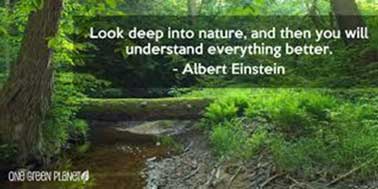 At the mature age of 29 years, I finally had the opportunity to attend university. I majored in psychology and minored in American literature, delving into great writers such as Henry James, William Faulkner, F. Scott Fitzgerald, Herman Melville, Mark Twain, Ernest Hemingway, Nathaniel Hawthorne, Ralph Waldo Emerson, and Henry David Thoreau.
At the mature age of 29 years, I finally had the opportunity to attend university. I majored in psychology and minored in American literature, delving into great writers such as Henry James, William Faulkner, F. Scott Fitzgerald, Herman Melville, Mark Twain, Ernest Hemingway, Nathaniel Hawthorne, Ralph Waldo Emerson, and Henry David Thoreau.
All these readings in the humanities convinced me of four things:
- All people are like me, sharing the same human frailty, suffering from the same sorrows and evils, and striving for meaning and happiness in spite of all their miseries.
- People are complex, and life is hard and complicated; therefore, there are no easy solutions to human problems without resorting to a higher, transcendental reality.
- Human society remains a part of the natural ecology because of our interrelatedness with other living things; without caring for the planet earth, eventually we will all perish.
- Human relationships with oneself, other people, nature, and God, are out of whack because of humanity’s greed and tremendous power to exploit nature and other people, particularly through science and technology.
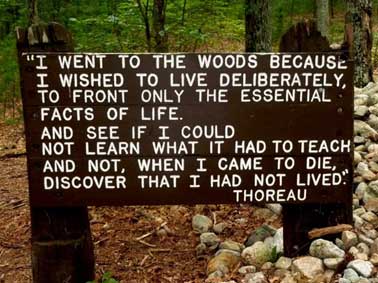 Therefore, it seemed to be that the only hope of finding a solution is to look for human universals or natural laws of what is good and right in all human beings. Such knowledge would help restore the balance in all these relationships and redirect humanity’s passions towards values that transcend egotism. These ideas were clearly contrary to the contemporary mental health practices of psychiatrists and psychologists, but they guided my research in graduate school and beyond.
Therefore, it seemed to be that the only hope of finding a solution is to look for human universals or natural laws of what is good and right in all human beings. Such knowledge would help restore the balance in all these relationships and redirect humanity’s passions towards values that transcend egotism. These ideas were clearly contrary to the contemporary mental health practices of psychiatrists and psychologists, but they guided my research in graduate school and beyond.
My Search for Positive Human Universals
In the 70s, during my early years at Trent University, without knowing much about Kant’s deontological theory of morality or the
innate deep structure of morality (e.g., John Mikhail’s [2011] Elements of Moral Cognition), I intuitively believed that we are made in God’s image and that there are a set of innate universal laws guiding us to live a good life, as long as we are not led astray by our greed and misguided ambitions.
Therefore, my first research question in my research on humanity was: “What is universally good for human beings in good times and bad times?” That sounded like a reasonable research question, but my first human study was a total disaster.
The study was a massive survey consisting of several pages of open-ended questions and rating scales, exploring what was considered universally good for human beings. I mailed out a few hundred Human Universals Surveys to randomly selected participants, but not a single person completed it and returned it with the self-stamped envelope. A couple thousand dollars of research money went down the drain, but an important lesson was learned.
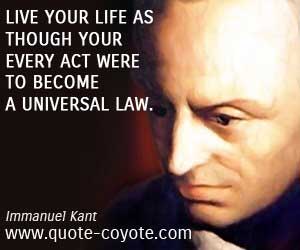
My second attempt at studying humanity’s universals was during the 80s. Benefitting from my last failure, I adopted the Implicit Theories approach to study meaning by first interviewing people face-to-face and asking them a simple open-ended question: “If money is not a concern, what is your ideal good life or meaningful life?”
The first stage of qualitative research was followed by quantitative research This project took several years to complete and was eventually published in 1998 (Wong, 1998).
This research shows that most people consider the following eight elements as important for the good life or meaningful life: general relationships, intimate relationships, achievement, acceptance of personal limitations, religious beliefs, self-transcendence, fairness (justice), and happiness (positive emotions). Happiness was removed from further analysis because it would confound the outcome measures of subjective wellbeing. My own research, and all subsequent research by others, have demonstrated that the seven sources of meaning are relevant in many cultures, and important for both enhancing wellbeing and reducing human suffering.
The most impressive finding of my Implicit Theories of the good life is that given the time to reflect and free choice without the concern of making money, most people exercise their freedoms responsibly by choosing healthy life goals, such as relating well to people, contributing to society, and seeking God’s help. In other words, these findings already contained important clues to crack nature’s code for positive mental health.
The Bruce Lee of Psychology
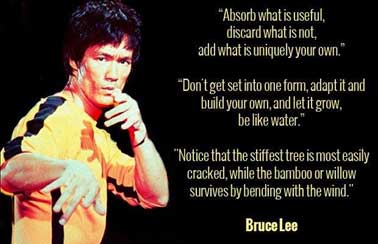 I was able to crack nature’s code because I refused to be confined to any silo and was open-minded in my search for nature’s way of what is good for all people, regardless of their race, religion, and socio-economic conditions.
I was able to crack nature’s code because I refused to be confined to any silo and was open-minded in my search for nature’s way of what is good for all people, regardless of their race, religion, and socio-economic conditions.
I consider myself the “Bruce Lee of Psychology,” because I am a misfit in any existing school. Being an outsider has caused me a great deal of problems in my psychology career, but I could not help being different for the following reasons:
(1) I am a bi-cultural person – raised in China but living in Canada.
(2) I have some honest misgivings about every school of psychology because of my different perspective.
(3) I have the instinctive desire to expand and absorb the best from each school.
(4) I am by nature an integrative maverick, trying to create a coherent framework that works for most people.
(5) I want to belong to a group, but I have stepped on too many toes because of my unconventional thinking.
(6) I have practiced and taught my integrative approach to psychotherapy for many years; each year, my students have found it more helpful than any single therapeutic modality.
(7) I have difficulty competing with so many established schools, but my nature and my cultural background would not allow me to be boxed into any silo,
(8) Nothing seems to work for many of my clients; they are glad that they have found me as their last resort,
(9) I feel sad for being ostracized, but feel very good for remaining true to my core values and integrative vision for a meaning-centered and purpose-driven life, and
(10) APA has recently advocated the path of collaboration and integration among different approaches to psychology. I am glad that I am a pioneering trail blazer.
What is Nature’s Solution to our Mental Health Needs in a Nutshell?
Nature’s solution consists of five interrelated parts as represented by this diamond, the symbol of PP 2.0, just as the smiley face is the symbol of PP 1.0. Diamonds are the hardest precious stone, and they can only be produced naturally through high pressure and heat over a long period of time. By the same token, we can become our best only through enduring hardships and overcoming suffering.
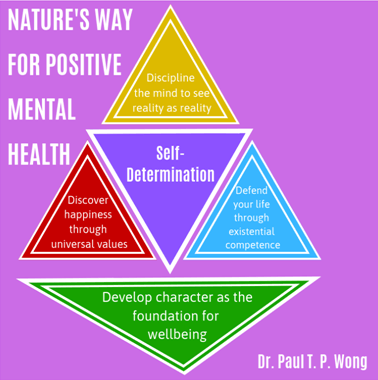
1. The Virtue of Responsibility
As human beings, we all have our responsibilities and duties to become our best in order to serve the common good.
2. The Basic Need for Mental Discipline
In order to adapt well to the world, we all need to develop the mental discipline to look at the world mindfully, meaningfully and dialectically.
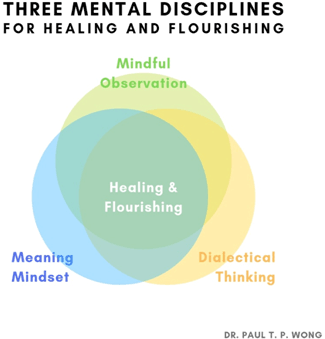
3. The Basic Needs for Positive Mental Health
We all need to fulfill our essential needs for meaningful work, loving relationships and spiritual faith – the Golden Triangle.
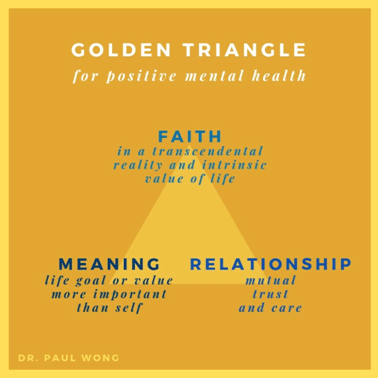
4. The Basic Strengths for Resilience
We all need to protect and fortify ourselves with courage, acceptance and the skills to transform negatives into positives – the Iron Triangle.
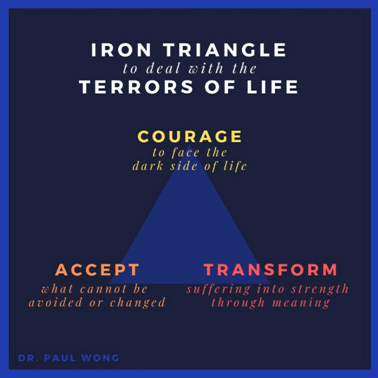
5) The Practical Wisdom of Dialectics
To seek balance and moderation with the skills of Yin-Yang dialectics in every situation and every relationship.
In subsequent articles, I will explain why these modules are effective both in overcoming the negative biases in our brain and negative forces in life, and in enhancing meaning and flourishing.
Why is this Meaning-centered Lifestyle most Natural and Adaptive?
- It is universal, yet diverse in experience and expression.
- It is simple, yet it requires wisdom in application.
- It is hidden in the deep structure of human nature, yet accessible to all people who seek it.
- It benefits not only the individual, but others and future generations.
- It resonates with human experiences from antiquity, and it also is consistent with all the modern empirical research.
- It is essential for healing and flourishing in times of suffering.
If we don’t adapt our lifestyle to the natural laws of positive mental health, we will eventually destroy both our own lives and the natural system of which we are an inherent part.

A Summary of How I Cracked Nature’s Code for Positive Mental Health
- It took a lifelong searching for meaning and happiness in the midst of suffering.
- It resulted from 5 decades of research in all the disciplines of psychology, from animal learning and developmental psychology, to social and personality psychology.
- It resulted from reading thousands of books, from both Eastern and Western literary sources, regarding human history and the human condition.
- It resulted from a lifetime of working with people from all parts of the world and from different faith traditions.
- It resulted from pursuing an unorthodox and lonely path after being marginalized by all existing schools of psychology.
- It resulted from seeking God’s help in searching for nature’s wisdom for mental health at a time when humans pose a threat to their own existence.
Conclusion
This paper argues the need for a paradigm shift towards nature’s holistic way of healing and thriving. This approach emphasizes respect for nature, for all life, and the need to live a balanced life in harmony with one’s true nature, others, and someone greater than oneself.
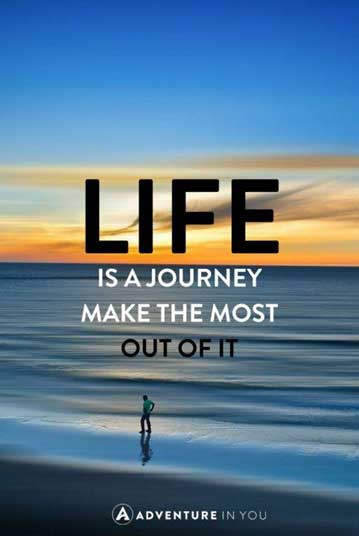
The journey of life can only be fully enjoyed by those who are well-prepared for the long and precarious journey. Character matters above all things; it is the fundamental requirement for living a meaningful and fulfilling life. They also need to develop the necessary life skills and practice the timeless universal values.
Out of many pathways, they choose the right path or life purpose that is most consistent with their own essence and the better angels of human nature.
They have the courage to face an unknown future and remain true to their core values and life goals, regardless of temptations and persecutions.
They have learned how to navigate troubled waters and weather the worst storms with wisdom and inner peace.
They enjoy the simple pleasures of spending time with their loved ones and friends, as well as the ecstasy of having overcome great difficulties.
They realize that life is hard and all people have their struggles. Therefore, they want to make life easier for others by being kind and fair at all times with compassion and courage.
They have learned to move beyond self-interest to serve the greater good and a higher purpose. They have the passion to work sacrificially to pursue their dreams and make the world a better place. In their humility, they become connected with the human family, nature, and transcendental reality.
Those who only want to live an easy and enjoyable life without hard work and hardships, and those who think that they already know everything there is to be known, are bound to be disappointed and miserable. Therefore, try to understand and embrace nature’s way of positive mental health as presented here.
References
- American Psychological Association. (2019, April 11). People with a sense of oneness experience greater life satisfaction: Effect is found regardless of religion. ScienceDaily. www.sciencedaily.com/releases/2019/04/190411101803.htm
- Ball, P. (2019). How to Grow a Human: Adventures in How We Are Made and Who We Are. University of Chicago Press.
- Batson, C. D., Ahmad, N., & Stocks, E. L. (2011). Four forms of prosocial motivation: Egoism, altruism, collectivism, and principlism. In D. Dunning (Ed.), Frontiers of social psychology. Social motivation (p. 103–126). Psychology Press.
- Covey, S. R. (1989). The 7 Habits of Highly Effective People. New York, NY: Free Press.
- De Reeover, J. (2013). Incurably Religious? Consensus Gentium and the Cultural Universality of Religion. Numen, 61(1), 5-32. Doi: 10.1163/15685276-12341301
- Executive of a Microblogging Company. (2020, September 9). Meaning, Purpose, and Logotherapy interview with Dr. Paul T. P. Wong. http://www.drpaulwong.com/interview-with-an-executive-of-a-microblogging-company
- Frankl, V. E. (1946/1985). Man’s Search for Meaning. New York, NY: Simon & Schuster.
- International Network on Personal Meaning. (2019, April 1). A new narrative is needed to combat the sharp rise in teen suicide, drug overdose, and depression. MarketsInsider. Retrieved from https://markets.businessinsider.com/news/stocks/a-new-narrative-is-needed-to-combat-the-sharp-rise-in-teen-suicide-drug-overdose-and-depression-1028073863
- Jung, C. (2013). The Essential Jung: Selected and introduced by Anthony Storr. Princeton University Press. (Original works published between 1902-1958)
- Kayabol, N. B. A., Gonzalez, J.-M., Gamble, H., Totenhagen, C. J., & Curran, M. A. (2020). Levels and volatility in daily relationship quality: Roles of daily sacrifice motives. Journal of Social and Personal Relationships. Advance online publication. DOI: 10.1177/0265407520945032
- Longrich, N. (2020). A Scientist Explains to us that Humans are Hardwired to Love Each Other. The National Interest. https://nationalinterest.org/blog/buzz/scientist-explained-us-humans-are-hardwired-love-each-other-123581
- Montagu, M. F. A. (Ed.). (1968). Man and Aggression (2nd). Oxford University Press.
- Neff, K. (2011). Self-Compassion: Stop Beating Yourself Up and Leave Insecurity Behind. HarperCollins Publishers.
- New International Version (NIV) Bible. (2011). New International Version (NIV) Bible (Original work published 1978). Biblica.
- Pargament, K. I. (1997). The psychology of religion and coping: Theory, research, practice. Guilford Press.
- Peck, M. S. (1978). The Road Less Travelled. London: Rider.
- Peterson, J. B. (2018). The 12 Rules for Life. New York, NY: Penguin Random House.
- Rosmarin, D. (2020). The connections paradigm: Ancient Jewish wisdom for modern mental health. Templeton Press.
- Routledge, C. (2018). Supernatural: Death, Meaning, and the Power of the Invisible World. New York, NY: Oxford University Press.
- Seligman, M. E. P. (2002). Authentic happiness: Using the new positive psychology to realize your potential for lasting fulfillment. New York, NY: Free Press.
- Sukel, K. (2019). In Sync: How Humans are Hardwired for Social Relationships. Dana Foundation. https://dana.org/article/in-sync-how-humans-are-hard-wired-for-social-relationships/
- Wong, P. T. P. (1998). Implicit theories of meaningful life and the development of the Personal Meaning Profile. In P. T. P. Wong, & P. Fry (Eds.), The human quest for meaning: A handbook of psychological research and clinical applications (pp. 111-140). Mahwah, NJ: Erlbaum.
- Wong, P. T. P. (2001, October). Tragic optimism, realistic pessimism, and mature happiness. Paper presented at the Positive Psychology Summit, Washington, DC.
- Wong, P. T. P. (2009). Existential positive psychology. In S. J. Lopez (Ed.), Encyclopedia of positive psychology (Vol. 1, pp. 361-368). Oxford, UK: Wiley Blackwell.
- Wong, P. T. P. (2011). Positive psychology 2.0: Towards a balanced interactive model of the good life.Canadian Psychology, 52(2), 69-81. https://doi.org/10.1037/a0022511
- Wong, P. T. P. (2015). Meaning-seeking, self-transcendence, and well-being.In A. Batthyany (Ed.), Logotherapy and existential analysis: Proceedings of the Viktor Frankl Institute (Vol. 1; pp. 311-322). Cham, Switzerland: Springer.
- Wong, P. T. P. (2016). Self-Transcendence: A Paradoxical Way to Become Your Best. International Journal Of Existential Positive Psychology, 6(1), 9. http://journal.existentialpsychology.org/index.php/ExPsy/article/view/178
- Wong, P. T. P. (2019a, July 6). How I cracked nature’s code for positive mental health: Introduction and my search for meaning. Positive Living in Difficult Times. https://www.meaning.ca/article/how-i-cracked-natures-code-for-positive-mental-health-introduction-and-my-search-for-meaning/
- Wong, P. T. P. (2019b, May 7). Learned helplessness or learned resourcefulness? Paul T. P. Wong. Retrieved from http://www.drpaulwong.com/learned-helplessness-or-learned-resourcefulness/
- Wong, P. T. P. (2019c). Assessing Jordan B. Peterson’s contribution to the psychology of well-being: A book review of 12 Rules of Life. International Journal of Wellbeing, 9(1), 83-102. https://doi.org/10.5502/ijw.v9i1.829
- Wong, P. T. P. (2020a). Existential Positive Psychology and Integrative Meaning Therapy. International Review of Psychiatry. DOI: 10.1080/09540261.2020.1814703
- Wong, P. T. P. (2020b). Made for Resilience and Happiness: Effective Coping with COVID-19 According to Viktor E. Frankl and Paul T. P. Wong. Toronto, ON: INPM Press.
- Wong, P. T. P. (2020c, September 24). The Unheard Cry of a Successful Asian Psychologist. The Journal of Psychology: Interdisciplinary and Applied. https://doi.org/10.1080/00223980.2020.1820430
- Wong, P. T. P., & Bowers, V. (2018). Mature happiness and global wellbeing in difficult times. In N. R. Silton (Ed.), Scientific concepts behind happiness, kindness, and empathy in contemporary society (pp. 112-134). Hershey, PA: IGI Global.
- Wong, P. T. P., Reker, G. T. & Peacock, E. (2006). The resource-congruence model of coping and the development of the Coping Schemas Inventory. In P. T. P. Wong, & L. C. J., Wong (Eds.), Handbook of multicultural perspectives on stress and coping (pp. 223-283). New York, NY: Springer.

 Meaning Conference 2025 will be the INPM’s first in-person conference with a virtual option after the pandemic.
Meaning Conference 2025 will be the INPM’s first in-person conference with a virtual option after the pandemic.